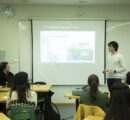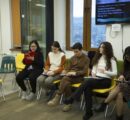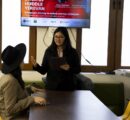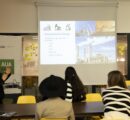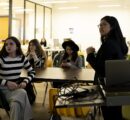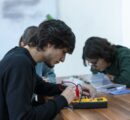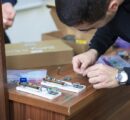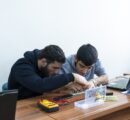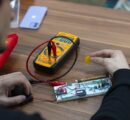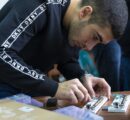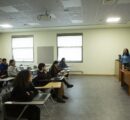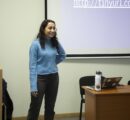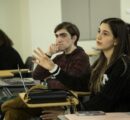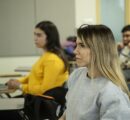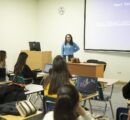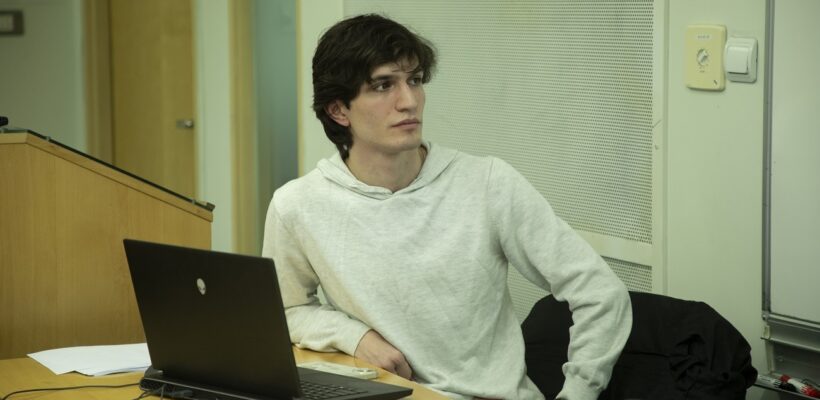
AUA-MIT Collaborative Science Series: Empowering Minds in Armenia
5 min readYEREVAN, Armenia — For the third consecutive year, the American University of Armenia (AUA) Zaven P. & Sonia Akian College of Science and Engineering (CSE), Acopian Center for the Environment (ACE), and Entrepreneurship and Product Innovation Center (EPIC), in collaboration with the Massachusetts Institute of Technology (MIT) International Science and Technology Initiative (MISTI), hosted a series of enlightening events for youth. This year, the collaborative effort brought students from MIT to Yerevan, where they delivered lectures and hosted hands-on workshops for science and engineering enthusiasts from various educational institutions in Armenia. “It is inspiring that AUA and other educational institutions across Armenia have forged such strong partnerships with MIT over the past several years. We are thrilled to once again host several MIT students to lead short-duration classes for enthusiastic high school and college students across a variety of subject areas. The knowledge exchange and the networking opportunities are invaluable,” commented CSE Dean Dr. Aram Hajian.
Spanning three weeks, from January 8 to 26, the courses were divided into three distinct directions: environment, computer science, and engineering. Joan Barcelona, a first-year Master of Business Administration (MBA) student at the MIT Sloan School of Management, led a workshop titled “Imagine, Case, and Simulate: Immersive Workshop on Climate and Sustainability.” Lily Janjigian, a senior MIT undergraduate student majoring in computer science, conducted a “Web Development Workshop,” while Grigor Tukharyan (BSES ’22), a master’s student at the MIT Department of Nuclear Science and Engineering, introduced “Nuclear Detection with Geiger Counters.” Dr. Michael Kouchakdjian, director of EPIC, shared his impressions of the workshop: “The workshops were offered in a very friendly and easygoing manner. Participants from EPIC were able to engage, and there was two-way knowledge sharing — just a terrific program.”
“Nuclear Detection with Geiger Counters,” Grigor Tukharyan
Grigor Tukharyan (BSES ’22) received his bachelor’s degree in engineering sciences from AUA. In his current research at MIT, Tukharyan is actively exploring the utilization of proton accelerators as a means to transmute and effectively mitigate long-lived fissile nuclear waste. Prior to pursuing his master’s degree, Grigor worked as a hardware engineer at Instigate Academy,
His three-week course included lectures and lab sessions. The theoretical component equipped students with a foundational understanding of nuclear interactions with photons, delving into essential statistical concepts crucial for nuclear detection. Additionally, the curriculum covered analog electronics necessary for crafting a Geiger counter and created a basis for students to acquire skills in data analysis using Python. Hovhannes Hovhannisyan (BSDS ’25) emphasized the importance of such courses for students eager to acquire the expertise and knowledge of their counterparts from top universities: “It is a good practice for AUA students like me to familiarize themselves with the teaching culture of top universities. It provides a soft skill set, along with the technical knowledge of the course.”
In the lab sessions, students translated theoretical knowledge into practical skills. They were engaged in constructing Geiger counters manually, employing analog electronics and breadboards. Additionally, the course explored the practical application of knowledge by analyzing radiation sources and shielding materials, utilizing the Geiger counters constructed by the students. Reflecting on his experience leading the workshop, Tukharyan said, “I am glad I was able to explain complex topics and then use real-life practice to harness the students’ newfound knowledge, showing how interactive teaching can help digest a lot of information in a short amount of time!”
“Web Development Workshop,” Lily Janjigian
Lily Janjigian, a computer science student at MIT, participates in a variety of university activities. Alongside her studies, she is a member of the Varsity Cross Country and Track and Field teams, as well as the Alpha Phi Sorority. She also holds a leadership position as one of the presidents of the MIT Armenian Society. She has been engaged as a software engineering intern on the Applied Machine Learning Data Science team at Apple.
The initial two weeks of her workshop were dedicated to providing students with a solid foundation in web development. This included an introduction to key tools and technologies, such as GitHub, HTML/CSS, JavaScript, React, API, and databases.
The third week of the workshop featured a hands-on approach, where students actively worked on creating their personal websites. The class structure allowed students to focus on their individual projects, while seizing the opportunity to seek guidance and ask questions. Janjigian noted: “Teaching at AUA this past month was an incredible experience. I was so impressed by how engaged my students were every day of class and how clearly motivated they were to learn and improve upon their web development skills. I also loved getting to know all of them and learning about their goals for the workshop and beyond! I definitely hope to be back soon.”
“Imagine, Case, and Simulate: Immersive Workshop on Climate and Sustainability,” Joan Barcelona
With an undergraduate degree in political economy from the University of California, Berkeley, Joan Barcelona has accumulated seven years of valuable work experience at PricewaterhouseCoopers International Limited (PwC) and tech company Box. Currently, she is a first-year MBA student at the MIT Sloan School of Management, with a keen interest in climate resilience and environmental sustainability for business.
The three-week immersive curriculum combined social fiction, hands-on problem-solving and insights, and cutting-edge climate tools, offering students an excellent opportunity to acquire the skills needed to make a real impact. Anush Vrtanesyan (BAEC ’26) shared her thoughts on her workshop experience: “One of my favorite aspects of this workshop was that we should always be positive-minded and try to take action toward keeping our environment in better shape. Every one of us is responsible for our planet, and every action we take to keep it in good condition, no matter how small, counts and will lead to something great!”
The first week of the curriculum centered on social fiction and sustainable futures. The second week shifted the focus to real-world energy business case studies, and in the final week, the curriculum incorporated the use of the En-ROADS simulation tool.
Barcelona was highly impressed by the students’ engagement, commenting: “Getting to teach my climate and sustainability class at AUA was an amazing experience as I had the chance to interact with engaged students who all want to make a difference. My vision for the class was to share various perspectives and critically think about how to help address climate change, considering numerous approaches and sharing hope for the future. I personally gained new perspectives from the students, as they brought insightful input and discussion points from which the rest of the class and I learned. Shnorhagalootyoon for this truly memorable experience!”
The success of this collaboration has cemented the fundamental groundwork for future initiatives and endeavors that can further enrich the academic and research landscape. This partnership holds the promise of contributing significantly to the advancement of education, research, and the pursuit of excellence in various fields.
Founded in 1991, the American University of Armenia (AUA) is a private, independent university located in Yerevan, Armenia, affiliated with the University of California, and accredited by the WASC Senior College and University Commission in the United States. AUA provides local and international students with Western-style education through top-quality undergraduate and graduate degree and certificate programs, promotes research and innovation, encourages civic engagement and community service, and fosters democratic values.

